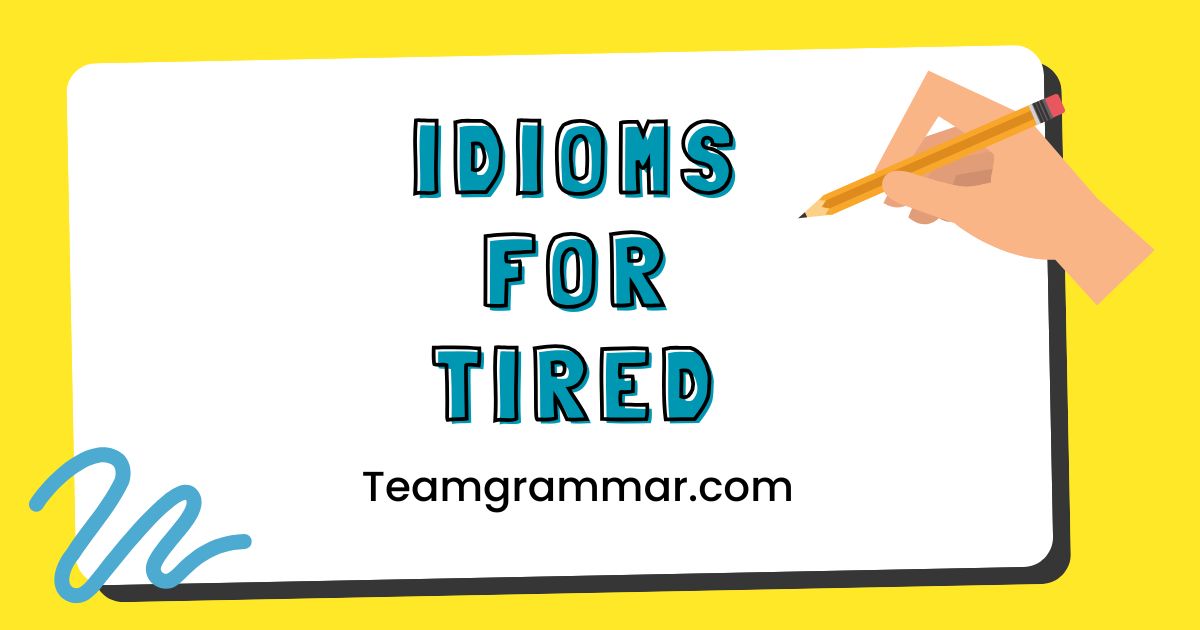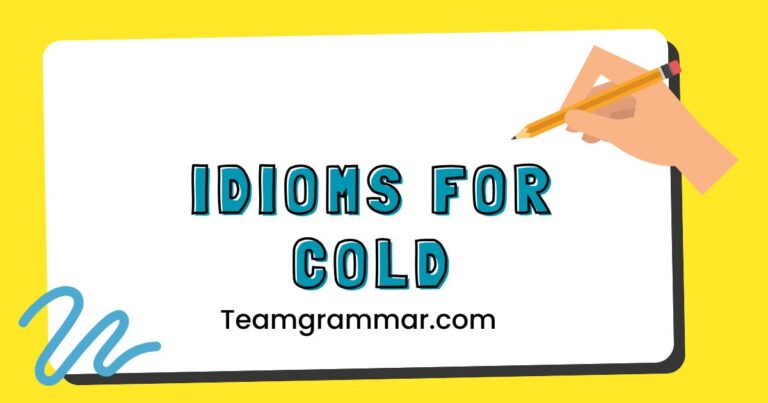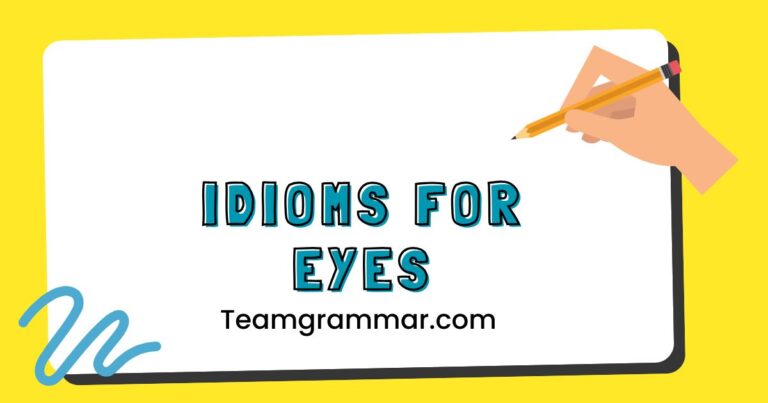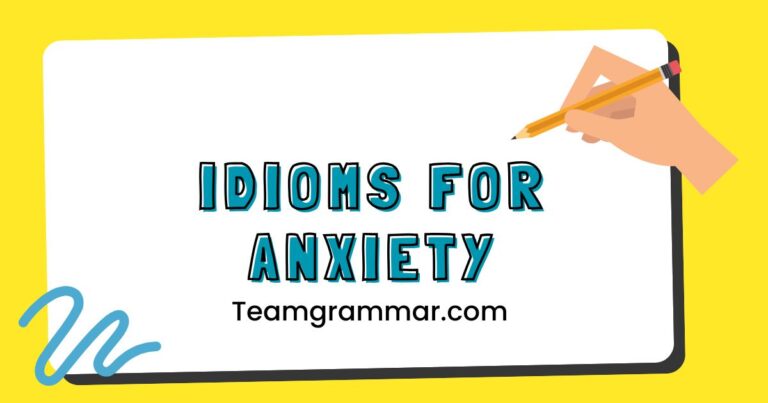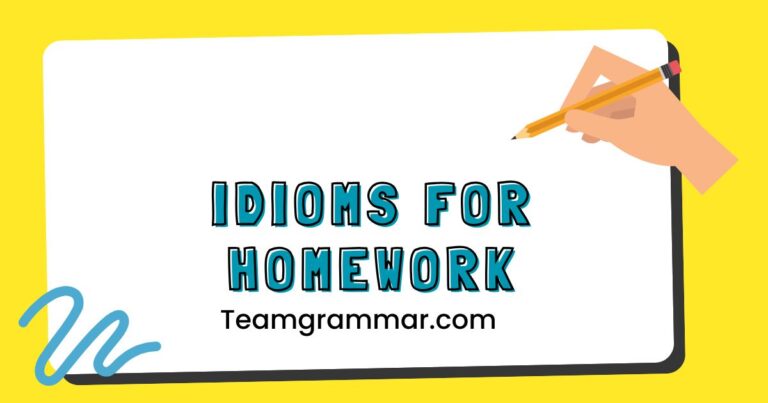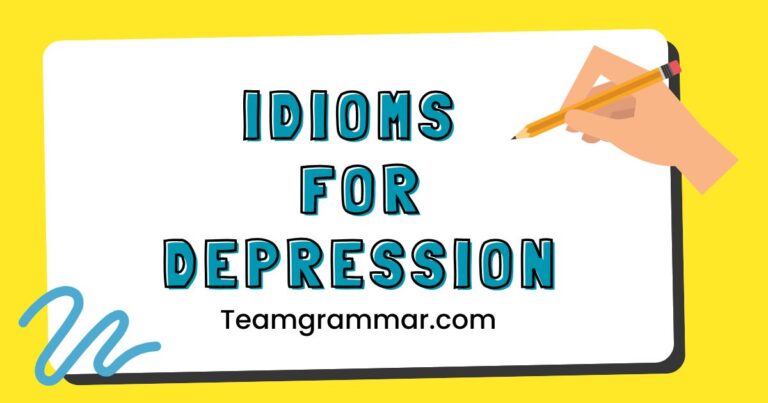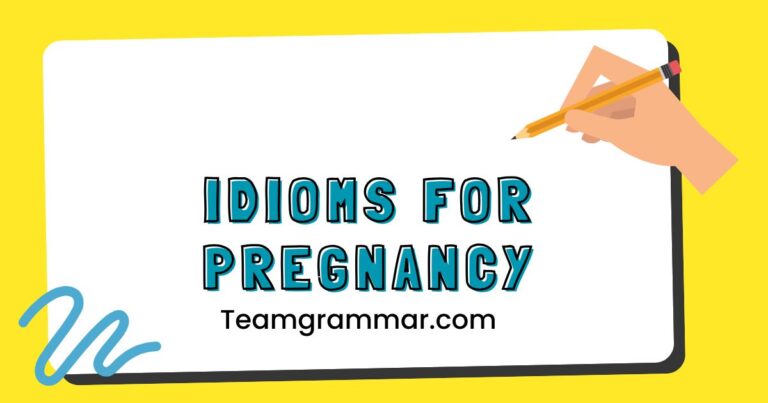27 Idioms for Tired: A Comprehensive Guide to Expressing Exhaustion
Expressing tiredness in English goes far beyond simply saying “I’m tired.” The English language is rich with idioms that paint a more vivid and nuanced picture of exhaustion. Understanding and using these idioms can significantly enhance your communication skills, making you sound more natural and expressive.
This article delves into a comprehensive collection of idioms related to tiredness, providing definitions, examples, and practical exercises to help you master their usage. Whether you’re an ESL learner or a native speaker looking to expand your vocabulary, this guide will equip you with the tools to articulate your fatigue with flair.
This guide will benefit English language learners of all levels, from beginners striving to understand common expressions to advanced speakers aiming for greater fluency and expressiveness. By exploring the diverse range of idioms related to tiredness, you will not only enrich your vocabulary but also gain a deeper understanding of the cultural nuances embedded within the English language.
This comprehensive exploration will focus on the meanings of the idioms, their practical usage, and common mistakes to avoid, ensuring you can confidently and accurately express your state of exhaustion.
Table of Contents
- Introduction
- Definition of Idioms for Tired
- Structural Breakdown
- Types and Categories of Tired Idioms
- Examples of Idioms for Tired
- Usage Rules for Tired Idioms
- Common Mistakes with Tired Idioms
- Practice Exercises
- Advanced Topics
- FAQ
- Conclusion
Definition of Idioms for Tired
Idioms are expressions whose meanings cannot be understood from the literal meanings of the individual words. Instead, they convey a figurative meaning that is culturally specific.
Idioms for “tired” are phrases that express a state of exhaustion, weariness, or lack of energy in a non-literal way. They add color and depth to our language, allowing us to communicate feelings of fatigue more creatively and effectively.
The function of these idioms is to convey the intensity and nuanced state of one’s tiredness, going beyond the simple declaration of being “tired.”
Idioms related to tiredness often draw on metaphors and similes to illustrate the feeling of being drained, depleted, or worn out. They can be classified based on the imagery they evoke, such as physical weight, depletion of resources, or comparisons to inanimate objects.
The context in which these idioms are used is crucial, as their meaning can vary slightly depending on the situation and the speaker’s intent. Understanding the nuances of these idioms allows for more precise and impactful communication, enriching conversations and written expression.
Structural Breakdown
Idioms, by nature, defy strict grammatical rules, as their meaning is not derived from their individual components. However, it’s helpful to understand how these idioms are structured to use them correctly.
Many idioms for “tired” are phrases that incorporate verbs, nouns, and adjectives in specific combinations. For example, “to be dead on one’s feet” uses the verb “to be,” the adjective “dead,” and the preposition “on” to create a vivid image of extreme exhaustion.
The structure can also include similes, such as “as tired as a dog,” which uses the comparison word “as” to link the feeling of tiredness to a commonly perceived characteristic of dogs.
The structural patterns of these idioms often follow established linguistic conventions, even if their overall meaning is non-literal. They can function as predicates, adjectival phrases, or even adverbial phrases, depending on the context.
For instance, “worn out” functions as an adjective, describing the state of being tired, while “running on fumes” acts as a predicate, describing how someone is functioning despite being extremely tired. Understanding these structural elements helps to integrate idioms seamlessly into sentences and to recognize their grammatical role within a broader context.
Types and Categories of Tired Idioms
Idioms for “tired” can be categorized based on the type of imagery they evoke and the intensity of the exhaustion they describe. Here are some common categories:
1. Physical Depletion
These idioms describe tiredness as a result of physical exertion, comparing the feeling to being physically drained or worn out.
2. Mental Exhaustion
These idioms relate to mental fatigue, often associated with stress, overthinking, or prolonged concentration.
3. Lack of Energy
These idioms express a general lack of energy and motivation, often depicting a feeling of being sluggish or lifeless.
4. Sleep Deprivation
These idioms specifically refer to tiredness caused by a lack of sleep or disrupted sleep patterns.
5. Overexertion
These idioms relate to feeling tired due to doing too much, pushing oneself beyond one’s limits.
Examples of Idioms for Tired
The following tables provide a comprehensive list of idioms for “tired,” categorized by their meaning and with example sentences to illustrate their usage.
Table 1: Idioms for Physical Depletion
This table provides idioms that describe tiredness as a result of physical exertion, comparing the feeling to being physically drained or worn out. Each idiom provides a definition and a sentence example.
| Idiom | Definition | Example Sentence |
|---|---|---|
| Dead on one’s feet | Extremely tired; exhausted. | After working a double shift, I was dead on my feet. |
| Worn out | Extremely tired; exhausted from exertion. | The marathon runner was completely worn out after the race. |
| Beat | Very tired. | I’m absolutely beat after that workout. |
| Knackered | Very tired (British English). | I’m absolutely knackered after that long walk. |
| Dog-tired | Extremely tired. | After helping my friend move all day, I was dog-tired. |
| Pooped | Exhausted. | The kids were pooped after playing in the park all afternoon. |
| Bushed | Very tired. | After hiking all day, I was completely bushed. |
| Dragging one’s feet | Moving slowly due to tiredness or reluctance; also, being unenthusiastic or disinclined. | I was dragging my feet to get to work this morning. |
| Out on one’s feet | Unable to stand because of tiredness. | The elderly woman was out on her feet after the long journey. |
| Ready to drop | Extremely tired and about to collapse. | After chasing after the kids all day, I was ready to drop. |
| Run ragged | Made extremely tired by being forced to work hard or do a lot of things. | The new puppy has run me ragged. |
| Running on empty | Continuing to function despite being extremely tired or lacking energy. | I’m running on empty today, but I have to finish this project. |
| Shattered | Extremely tired (British English). | I’m absolutely shattered after that hike. |
| Tired to the bone | Extremely tired; exhausted to the core. | After working in the fields all day, he was tired to the bone. |
| Wiped out | Completely exhausted. | I was completely wiped out after the exam. |
| Feeling drained | Feeling emotionally, mentally, or physically exhausted. | After dealing with the difficult customer, I was feeling drained. |
| On one’s last legs | Near the point of collapse due to exhaustion or age. | After the long walk, the old dog was on his last legs. |
| Fried | Exhausted, often due to overwork or stress. | I’m feeling totally fried after the project deadline. |
| Burned out | Exhausted and unable to function normally due to prolonged stress or overwork. | She was completely burned out after years of working in high-pressure environments. |
| Like death warmed up | Looking or feeling extremely unwell or tired. | You look like death warmed up; you should go home and rest. |
| Fit to drop | Extremely tired. | I’m fit to drop after that workout. |
| All in | Completely exhausted, having used all one’s energy. | After the final sprint, I was all in. |
| No spring in one’s step | Lacking energy and enthusiasm in one’s movements. | He had no spring in his step after the tiring day. |
| Running on fumes | Continuing to function despite being extremely tired or lacking energy. | I’m running on fumes trying to finish this project. |
Table 2: Idioms for Mental Exhaustion
This table lists idioms related to mental fatigue, often associated with stress, overthinking, or prolonged concentration. The table includes the idiom, its definition, and an example sentence.
| Idiom | Definition | Example Sentence |
|---|---|---|
| Brain-fried | Mentally exhausted; unable to think clearly. | After the intense exam, my brain felt completely brain-fried. |
| Mind-numbing | Extremely boring or repetitive, leading to mental fatigue. | The repetitive data entry task was mind-numbing. |
| Zoned out | Mentally drifting away; not paying attention due to fatigue or boredom. | I completely zoned out during the lecture. |
| Burnt out | Experiencing emotional, physical, and mental exhaustion caused by prolonged or excessive stress. | She was completely burnt out after years of working in a high-pressure job. |
| At the end of one’s rope | Having no more patience, strength, or resources to cope with a difficult situation. | After dealing with the constant demands, I felt like I was at the end of my rope. |
| Stressed out | Feeling overwhelmed or anxious due to excessive stress. | I’ve been so stressed out with work lately. |
| Frazzled | Completely exhausted and overwhelmed, often due to stress or overwork. | She felt frazzled after managing the crisis at work. |
| Worn to a frazzle | Extremely tired and stressed. | He was worn to a frazzle after dealing with the difficult customers all day. |
| Drained | Feeling emotionally or mentally exhausted. | The constant meetings left me feeling completely drained. |
| Out of steam | Having no more energy or enthusiasm to continue. | I’m completely out of steam after working on this project for weeks. |
| Feeling the strain | Experiencing the effects of stress or overwork. | I’m really feeling the strain of these long hours. |
| Under pressure | Feeling stressed and burdened by demands or expectations. | I’m under a lot of pressure to meet the deadline. |
| Hitting a wall | Reaching a point where one can no longer make progress due to mental or physical exhaustion. | I hit a wall in the middle of studying and couldn’t concentrate anymore. |
| Brain dead | Unable to think clearly due to exhaustion or boredom. | After the long lecture, I was completely brain dead. |
| Foggy brain | A state of mental confusion or lack of clarity, often due to fatigue or stress. | I have a foggy brain today because I didn’t sleep well. |
| One’s brain is fried | Unable to think clearly due to exhaustion. | After that test, my brain is fried. |
| Unable to think straight | Not able to think clearly or logically, often due to tiredness or stress. | I’m so tired I can’t think straight. |
| Lost one’s train of thought | Having forgotten what one was talking or thinking about, often due to distraction or fatigue. | I’m so tired I lost my train of thought. |
| Can’t focus | Unable to concentrate or pay attention. | I’m so tired I can’t focus on this task. |
| Mentally shot | Mentally exhausted. | I’m mentally shot after that exam. |
| On autopilot | Doing something without thinking because one is too tired or bored. | I was so tired I was just on autopilot at work today. |
| Space out | To become inattentive or mentally detached from one’s surroundings. | I tend to space out when I’m really tired. |
| Feeling punch-drunk | Feeling dazed or disoriented, as if after taking a blow to the head. | After the long day, I was feeling punch-drunk. |
Table 3: Idioms for Sleep Deprivation
This table provides idioms that specifically refer to tiredness caused by a lack of sleep or disrupted sleep patterns. The table includes the idiom, its definition, and an example sentence.
| Idiom | Definition | Example Sentence |
|---|---|---|
| Running on fumes | Continuing to function despite being extremely tired due to lack of sleep. | I only got two hours of sleep last night, so I’m running on fumes today. |
| Sleep-deprived | Suffering from a lack of sleep. | As a new parent, I’m constantly sleep-deprived. |
| Didn’t sleep a wink | Not having slept at all. | I was so nervous about the presentation that I didn’t sleep a wink. |
| Lost sleep over something | Worried about something so much that one cannot sleep. | I lost sleep over the upcoming exam. |
| Up all night | Having stayed awake the entire night. | I was up all night studying for the test. |
| Burning the midnight oil | Working or studying late into the night. | I’ve been burning the midnight oil to finish this report. |
| Eyes are heavy | Feeling sleepy and finding it difficult to keep one’s eyes open. | My eyes are heavy; I need to go to bed. |
| Tired eyes | Eyes that feel strained or exhausted due to lack of sleep. | I have such tired eyes from staring at the computer screen all day. |
| Groggy | Dazed, weak, or confused, especially after waking up. | I felt groggy after the alarm woke me up. |
| Sleepyhead | A person who is habitually sleepy or likes to sleep a lot. | Wake up, sleepyhead! It’s time for school. |
| Out like a light | To fall asleep very quickly and deeply. | As soon as my head hit the pillow, I was out like a light. |
| Doze off | To fall asleep lightly or for a short period. | I tend to doze off during long meetings. |
| Nod off | To fall asleep briefly, often unintentionally. | I nodded off during the movie. |
| Catch some Z’s | To sleep. | I need to catch some Z’s before the big game. |
| Hit the hay | To go to bed. | I’m going to hit the hay; goodnight! |
| Get some shut-eye | To get some sleep. | I need to get some shut-eye before my flight. |
| Couldn’t keep one’s eyes open | Unable to stay awake because of tiredness. | I was so tired I couldn’t keep my eyes open. |
| Not one’s usual self | Behaving differently than usual, often due to tiredness or illness. | I’m not my usual self today because I didn’t get enough sleep. |
| Rested | Having had enough sleep or rest. | I feel much more rested after a good night’s sleep. |
| Bright-eyed and bushy-tailed | Full of energy and enthusiasm, especially early in the morning. | She arrived at work bright-eyed and bushy-tailed despite the early hour. |
Usage Rules for Tired Idioms
When using idioms for “tired,” it’s essential to consider the context and the audience. Some idioms are more formal than others, and some are specific to certain regions or cultures (e.g., British English).
It’s also important to use the idioms correctly in terms of grammar and syntax. For instance, idioms that function as adjectives should be used to modify nouns, while idioms that function as verbs should be used as the main verb in a sentence.
Regional Variations:Some idioms are more common in certain regions. For example, “knackered” is primarily used in British English, while “pooped” is more common in American English.Formality:Consider the formality of the situation.
Some idioms, like “dead on one’s feet,” are suitable for informal conversations, while others, like “experiencing fatigue,” are more appropriate for formal settings.Correct Usage:Ensure that the idiom is used correctly in terms of grammar. For example, “worn out” is an adjective and should be used to describe a noun (e.g., “I am worn out”).
Common Mistakes with Tired Idioms
One common mistake is to misinterpret the meaning of an idiom due to its non-literal nature. Another mistake is to use an idiom in an inappropriate context, such as using a very informal idiom in a formal presentation.
It’s also important to avoid mixing up similar idioms or using them incorrectly in a sentence.
Literal Interpretation:Avoid interpreting idioms literally. For example, “dead on one’s feet” does not mean that someone is actually dead.Contextual Misuse:Be mindful of the context.
Don’t use informal idioms in formal situations.Mixing Up Idioms:Avoid confusing similar idioms. For example, “worn out” and “burned out” have slightly different meanings.
Here are some examples of common mistakes and their corrections:
| Incorrect | Correct | Explanation |
|---|---|---|
| I am very tire. | I am very tired. | “Tire” is a verb, while “tired” is an adjective describing the state of being. |
| He is dead on his foot. | He is dead on his feet. | The correct idiom is “dead on one’s feet,” with “feet” in plural form. |
| She is burning the midnight oil for relax. | She is burning the midnight oil to study. | “Burning the midnight oil” implies working or studying, not relaxing. |
| I am feeling drain. | I am feeling drained. | “Drained” is the correct adjective form to describe the feeling of exhaustion. |
Practice Exercises
Test your understanding of idioms for “tired” with the following exercises.
Exercise 1: Fill in the Blanks
Fill in the blanks with the appropriate idiom from the list below.
Idiom List: dead on my feet, worn out, running on fumes, brain-fried, didn’t sleep a wink
| Question | Answer |
|---|---|
| 1. After the intense project, my brain felt completely _____. | brain-fried |
| 2. I _____, so I’m not at my best today. | didn’t sleep a wink |
| 3. I’m _____ after working a double shift at the hospital. | dead on my feet |
| 4. I’m _____ trying to meet the deadline. | running on fumes |
| 5. The athlete was completely _____ after the marathon. | worn out |
| 6. After working on the computer for 12 hours straight, my brain is _____. | brain-fried |
| 7. The baby cried all night, so I _____. | didn’t sleep a wink |
| 8. After helping my friend move all day, I’m _____. | dead on my feet |
| 9. I’m _____ trying to finish this project before vacation. | running on fumes |
| 10. The old car was _____ after the long road trip. | worn out |
Exercise 2: Multiple Choice
Choose the best idiom to replace the underlined phrase in each sentence.
| Question | Options | Answer |
|---|---|---|
| 1. After the long hike, I was extremely tired. | a) full of beans b) dog-tired c) on top of the world | b) dog-tired |
| 2. I am very tired after the stressful week at work. | a) bright-eyed b) beat c) refreshed | b) beat |
| 3. I couldn’t sleep at all last night because I was worried about the presentation. | a) caught some Z’s b) slept like a log c) didn’t sleep a wink | c) didn’t sleep a wink |
| 4. After the intense exam, my brain felt mentally exhausted. | a) brain-fried b) clear-headed c) sharp | a) brain-fried |
| 5. I am continuing to function despite being tired to finish this project. | a) full of energy b) running on fumes c) raring to go | b) running on fumes |
| 6. After a long day, I just want to go to bed. | a) hit the books b) hit the hay c) hit the road | b) hit the hay |
| 7. The repetitive task was so boring and tiring. | a) mind-numbing b) exhilarating c) stimulating | a) mind-numbing |
| 8. I was so tired that I fell asleep briefly during the movie. | a) stayed wide awake b) nodded off c) jumped for joy | b) nodded off |
| 9. She felt overwhelmed and exhausted after managing the crisis. | a) frazzled b) calm c) composed | a) frazzled |
| 10. He was extremely tired after working in the fields all day. | a) tired to the bone b) full of vim and vigor c) refreshed | a) tired to the bone |
Advanced Topics
For advanced learners, exploring the etymology and cultural context of idioms for “tired” can provide a deeper understanding of their usage. Additionally, analyzing literary works and media to identify how these idioms are used in different contexts can further enhance comprehension and fluency.
Consider exploring idioms from different English-speaking countries to appreciate the diversity of expression.
Etymology: Research the origins of idioms to understand their historical and cultural significance.
Literary Analysis: Study how authors use idioms to convey character emotions and create vivid imagery.
Cross-Cultural Comparisons: Compare idioms for “tired” in different English-speaking countries to appreciate regional variations.
FAQ
Here are some frequently asked questions about idioms for “tired.”
- What is the difference between “tired” and “exhausted”?
While both terms describe a state of weariness, “exhausted” implies a more severe level of tiredness, often resulting from significant physical or mental exertion. “Tired” is a general term, while “exhausted” suggests a complete depletion of energy.
- Are idioms for “tired” used in formal writing?
Some idioms are acceptable in formal writing, but it depends on the specific idiom and the context. Generally, it’s best to use more formal and direct language in academic or professional writing. However, a well-chosen idiom can add impact and clarity in certain situations. For instance, instead of saying “the team was very tired after working on the project” you could say “the team was exhausted after working on the project for 6 months.”
- How can I learn more idioms for “tired”?
Read widely, listen to native speakers, and use online resources to expand your vocabulary. Pay attention to how idioms are used in context and practice using them in your own speech and writing. Idiom dictionaries and language learning apps can also be valuable tools.
- Is it okay to use idioms if I’m not a native speaker?
Yes, but be careful to use them correctly and in appropriate contexts. Start with common idioms and gradually expand your repertoire as you become more comfortable with the language. If unsure, ask a native speaker for feedback.
- What are some other ways to express tiredness besides idioms?
You can use adjectives like “weary,” “fatigued,” “drained,” or “lethargic.” You can also use phrases like “lacking energy,” “feeling run-down,” or “in need of rest.” Additionally, you could use metaphors and similes to illustrate your tiredness, such as “I feel like a zombie” or “I’m running on fumes.”
- How do I know which idiom is appropriate for a specific situation?
Consider the level of formality, the intensity of your tiredness, and the audience. Some idioms are more suitable for casual conversations, while others are more appropriate for formal settings. Also, pay attention to the specific nuances of each idiom to ensure it accurately reflects your state of exhaustion.
- Can I create my own idioms for “tired”?
While it’s possible to create new expressions, it’s generally best to stick to established idioms to ensure clear communication. However, you can adapt existing idioms to create a unique effect, as long as the meaning remains clear and understandable.
- How can I remember the meanings of different idioms?
Use mnemonic devices, create flashcards, and practice using the idioms in sentences. Also, try to associate each idiom with a specific image or situation to help you recall its meaning. Regular review and practice are key to mastering idioms.
- Are there any idioms that express the opposite of being tired?
Yes, idioms like “full of beans,” “full of vim and vigor,” “bright-eyed and bushy-tailed,” “raring to go,” and “on top of the world” express energy and enthusiasm, the opposite of being tired.
Conclusion
Mastering idioms for “tired” can significantly enhance your ability to express yourself in English, adding depth, color, and nuance to your communication. By understanding the definitions, usage rules, and common mistakes associated with these idioms, you can confidently and accurately convey your state of exhaustion in a variety of contexts.
Remember to consider the formality of the situation and the regional variations when choosing an idiom, and practice using them regularly to improve your fluency.
Continue to expand your vocabulary by reading widely, listening to native speakers, and exploring online resources. Pay attention to how idioms are used in different contexts, and don’t be afraid to experiment with them in your own speech and writing.
With practice and dedication, you can master the art of expressing tiredness in English with flair and precision, enriching your communication and enhancing your overall language proficiency. Embrace the richness of the English language, and let your expressions of tiredness be as vivid and descriptive as the feeling itself.

